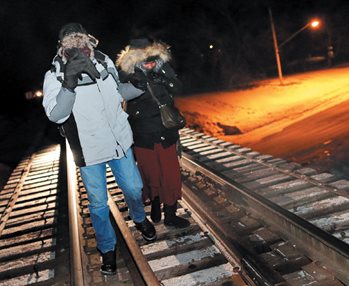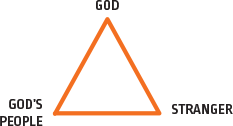By Loren Balisky and Mark Glanville.
Refugees walk along railway tracks from the United States to enter Canada at Emerson, Man. in February. Photo: Reuters / Lyle Stafford
A few months ago on Christmas Eve, Seidu Mohammed and Razak Iyal walked into Manitoba in freezing conditions. They had independently fled Ghana and claimed refugee protection in Canada. Mohammed lost all his fingers due to frostbite. Because of his injuries he can no longer play soccer. He plans instead to coach children’s soccer.
Like Mohammed and Iyal, 1,860 asylum seekers walked across the Canadian–U.S. border in the first three months of 2017, seeking refuge in Canada.
Mostly, Canadians are welcoming these newcomers. Manitoba, for example, is opening 14 new emergency housing shelters for asylum seekers. These new initiatives join a long Canadian tradition of offering support and friendship to displaced people.
There have also been negative responses from some politicians and journalists, some raising good questions that require careful consideration, others that seem calculated merely to score political points.
This range from welcome to resistance shouldn’t surprise us. The Canadian population as a whole vacillates between "notoriously short-lived carnivalesque explosions of solidarity and care," to use the words of philosopher Zigmunt Bauman, and on the other hand "refugee fatigue" and even "refugee panic."
The photo of the body of Alan Kurdi, a drowned Syrian boy, springboarded an extraordinary level of global awareness, mostly through Facebook shares. Yet within months the real human tragedy that continued to unfold in the Mediterranean Sea had turned into dull routine, at least as far as Facebook was concerned.
What is a biblical response? Clearly Christians who desire to respond with compassion and wisdom need an anchor to avoid this seasick heaving to-and-fro.
Let’s consider first, who are these recent newcomers, and what will happen to them?
Asylum Seekers
These unexpected journeys into Canada are a response, in part, to negative politics in the U.S. concerning refugees and migrants that have arisen during the course of Trump’s presidency. These people-on-the-move long for refugee protection so they can stop running and build a new life.
After arriving in Canada, asylum seekers make a claim for refugee status. Canada arguably has one of the most rigorous and fair refugee determination systems in the world, administered by the Immigration and Refugee Board of Canada.
When an asylum seeker makes a claim, it’s taken seriously and a decision is rendered by the Refugee Board. A positive decision means they get Convention Refugee status, allowing them to live safely in Canada while applying for permanent residence. Last year, 63 per cent of asylum seekers received protection through our inland refugee determination system.
The best-known biblical passage regarding the stranger in Scripture is probably Deuteronomy 10:17–18: "The Lord executes justice for the fatherless and the widow, and loves the stranger, giving them food and clothing. Love the stranger, therefore, for you were strangers in the land of Egypt."
Notice how the word "love" is used here regarding strangers. Just a few verses previous is an affirmation of God’s love for God’s people, ancient Israel (Deuteronomy 10:15): "Yet the Lord set His heart in love on your fathers and chose their offspring after them, you above all peoples, as you are this day."
There is a deliberate association here between God’s love for ancient Israel, His love for the stranger and Israel’s love for the stranger.
 The kind of love God has for His people is the same as He has for the stranger. In turn, God’s people were to offer the stranger that same love.
The kind of love God has for His people is the same as He has for the stranger. In turn, God’s people were to offer the stranger that same love.
God loves displaced people and has a particular concern and care for vulnerable people. We could say God is on the stranger’s side.
Valid Concerns
Loving, compassionate Christians can still have valid concerns that deserve careful consideration about accepting refugees.
Some of us worry, first, about helping asylum seekers because we think of them as illegal.
In fact, under international and Canadian law, people seeking refugee protection may cross an international boundary. As soon as claim process in Canada, they are part of a legal system.
So, actually, there is no such thing as an illegal refugee claimant.
Second, some of us wonder if refugees are safe for the community.
Understandably, terrorism can make some people nervous about outsiders. However, the groups who organize terrorist attacks are the very people refugees are fleeing.
Asylum seekers come into Canada for their own safety, not to make Canada unsafe. They are thoroughly screened for identity and security by Canadian enforcement agencies before they are released.
Third, we may worry about Canada being swamped.
In fact, asylum seekers are not overwhelming Canada. Last year 23,894 asylum seekers entered Canada, a small dribble compared to the 800,000 people Germany welcomed. Or consider Lebanon, a country one-third the size of Vancouver Island with a population of 4.5 million (the same as the population of all of B.C.). Lebanon hosts around 1.5 million refugees.
Love for Strangers
As we continue to work through our concerns, we also should consider how study upon study has demonstrated the economic benefits refugees bring to a country, especially when given the chance to settle, find employment and build a life. A swift, appropriate and warm welcome accelerates their capacity to integrate, engage and give back.
In Canada, as in every country, welcoming newcomers may stir feelings of both compassion and fear – sometimes even in the same person. We should not ignore these feelings, but neither should we act on them impulsively without first having charitable public discussions.
As Christians coming to these discussions, we bring our knowledge of the love of God in Christ and our knowledge of God’s love for the stranger. God’s love has guided the Canadian Church in supporting refugees for decades. God’s love is an anchor that grounds us, even as society heaves to-and-fro.
Provincial Agencies Supporting Refugees
Most agencies assisting asylum seekers in this country are faith based – frankly, most are Christian. They are all small, bighearted and underfunded. If you want to get involved in supporting refugees, here are some agencies to start with:
British Columbia: Journey Home Community Association, www.JourneyHomeCommunity.ca
Alberta: Calgary Catholic Immigration Society, www.CCIS-Calgary.ab.ca
Manitoba: Manitoba Immigration Interfaith Council, www.MIIC.ca
Ontario: Matthew House Toronto, www.MatthewHouse.ca
Quebec: Action Réfugiés Montréal, www.ActionR.org
|
Loren Balisky is the founder and executive director of Kinbrace Refugee Housing and Support, Vancouver. Mark Glanville pastors at Grandview Church (the church that birthed Kinbrace). He is also professor of Old Testament at Missional Training Center, Phoenix, Ariz.